Canada
Transportation Secretary Buttigieg honored by Québec LGBTQ org
The annual award is bestowed on “an individual or group who has made exceptional contributions to the advancement of LGBTQ rights”
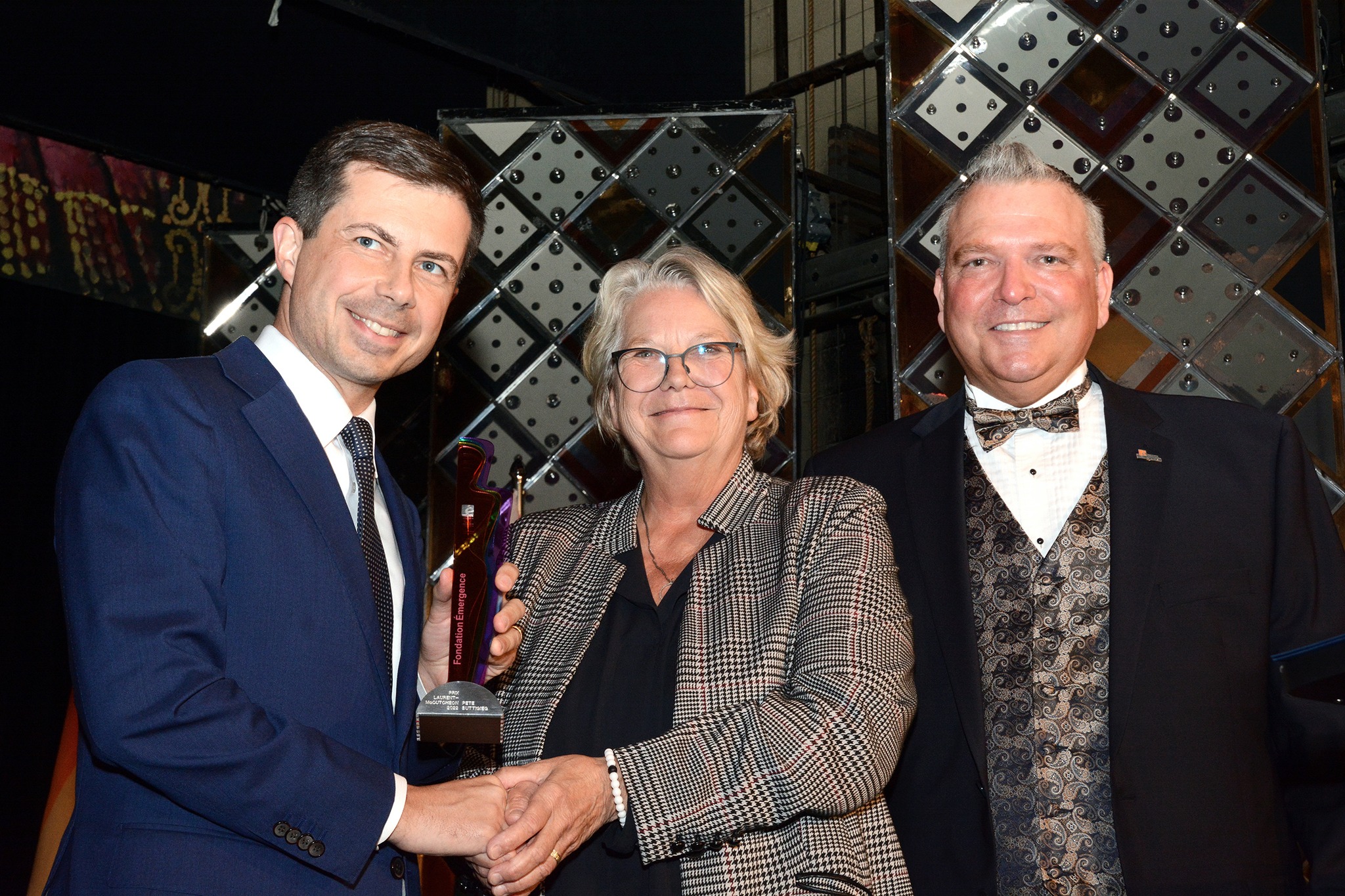
MONTREAL, Québec – In a special ceremony Wednesday evening, Fondation Émergence, one of Québec’s largest LGBTQ organizations, presented U.S. Secretary of Transportation Pete Buttigieg with the prestigious Laurent McCutcheon Award.
Buttigieg was in Montréal representing the United States at the International Civil Aviation Organization, (ICAO) General Assembly.
The Laurent McCutcheon Award is named for Laurent-McCutcheon, the founding president of Fondation Émergence and the creator of the National Day Against Homophobia, which became the International Day Against Homophobia and Transphobia.
The annual award is bestowed on “an individual or group who has made exceptional contributions to the advancement of LGBTQ rights.” In presenting Secretary Buttigieg, the citation [translated from French] noted his journey as the first openly gay man to be confirmed by the Senate to serve the office of the President of the United States as a cabinet minister.
Fondation Émergence also said that [Buttigieg] is a real role model for the LGBTQ+ communities. The Laurent McCutcheon Award was presented to Secretary Buttigieg by Chantal Rouleau, Québec’s outgoing* Minister for Transport and Minister Responsible for the Region of Montréal.
“I am truly humbled and honored to accept this award, especially as I have learned more about Laurent McCutcheon’s remarkable life and profound legacy,” Buttigieg said. “Like all of us here I am the beneficiary of a tradition of activism that spans the globe and generations before I was born. And the results of those struggles, in our lifetime, are borderline incredible – including the very fact that I can stand before you today.”
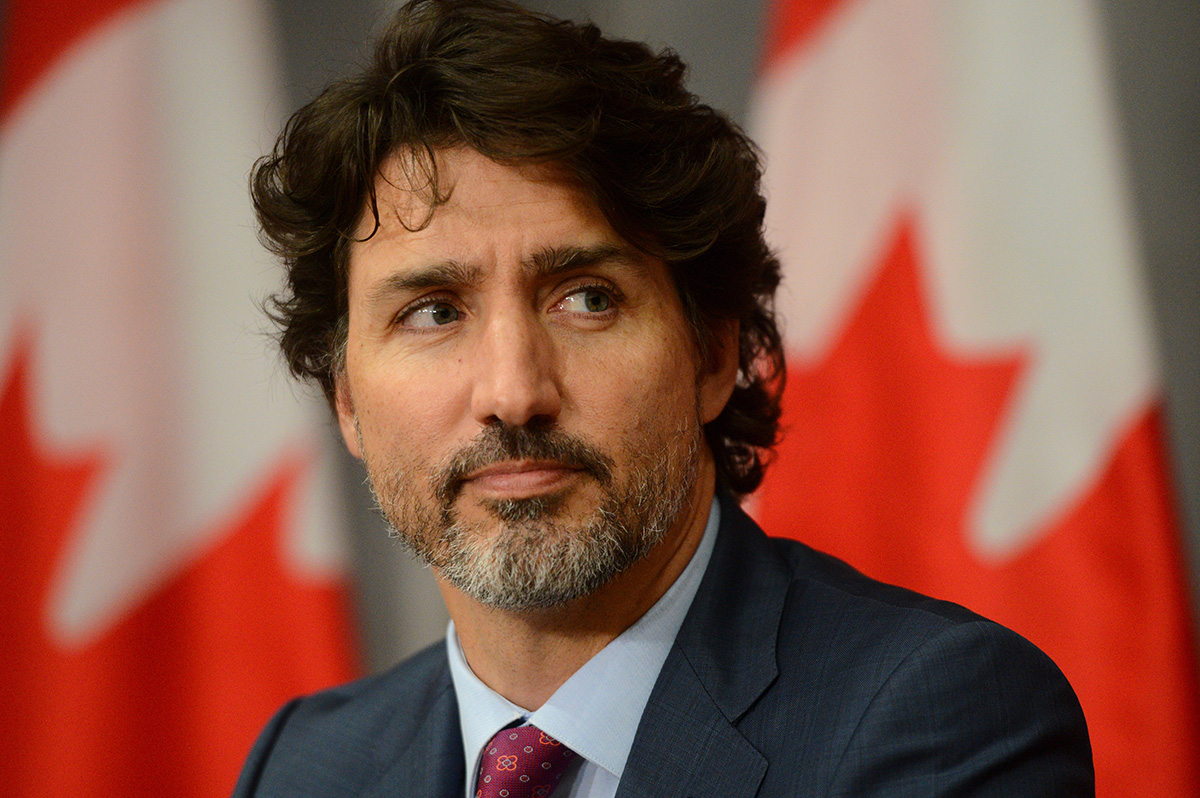
Canadian Prime Minister Justin Trudeau on Monday announced he will resign as the leader of his Liberal Party.
The announcement, which came against the backdrop of growing calls for the embattled prime minister to resign that increased after Finance Minister Chrystia Freeland, who was the country’s deputy prime minister, stepped down from the government last month, will set the stage for national elections that must take place before Oct. 20.
CNN notes polls show the Liberal Party would lose to the Conservative Party of which anti-LGBTQ+ MP Pierre Poilievre is the leader.
Trudeau became prime minister in 2015 when he defeated then-Prime Minister Stephen Harper. Trudeau’s father, Pierre Trudeau, was Canada’s prime minister from 1968-1979 and from 1980-1984.
The younger Trudeau is the first Canadian prime minister to have marched in a Pride parade.
Canada in 2022 banned so-called conversion therapy, which Justin Trudeau described as a “hateful and harmful practice.” Justin Trudeau in 2017 also formally apologized to Canadians who suffered persecution and discrimination under the country’s anti-LGBTQ+ laws — including those convicted of “gross indecency” before Canada decriminalized consensual same-sex sexual relations — and policies
“We have failed to (protect) LGBTQ2 communities, individuals time and time again,” he said. “It is with shame and sorrow and deep regret that the things we have done that I stand here today and say we were wrong, we apologize. I am sorry. We are sorry.”
Canada
Toronto Pride parade cancelled after pro-Palestinian protesters disrupt it
Protest took place more than three hours after it began

Toronto Pride parade organizers on Sunday cancelled the annual event after a group of pro-Palestinian protesters disrupted it.
Media reports indicate more than two dozen protesters blocked the parade near the intersection of Yonge and Wellesley Streets, and chanted “from the river to the sea” and “Pride was a riot.”
The pro-Palestinian protestors that brought the Toronto Pride Parade to a stop chant the genocidal “From the river to the sea” slogan as they continue to block the parade’s path.
Footage by @BethBaisch pic.twitter.com/SMldTpLFvk
— The Post Millennial (@TPostMillennial) June 30, 2024
The Toronto Star reported the protesters disrupted the parade at around 5:30 p.m., more than three hours after it began. Toronto Pride around 45 minutes later announced the parade’s cancellation.
“Today, we made the decision to cancel the remainder of the Pride Parade out of our commitment to ensuring public safety,” they said in a statement. “While we deeply respect and uphold everyone’s right to peacefully protest, our foremost priority is the well-being of all participants and spectators.”
“We recognize the Pride parade as a highly anticipated event that many organizations and individuals eagerly prepare for,” it added. “We empathize with those who were looking forward to participating and regret any inconvenience caused by this decision.”
The Coalition Against Pinkwashing organized the protest.
Protesters disrupt NYC Pride parade
This year’s Pride Month took place eight months after Hamas launched its surprise attack against southern Israel.
The Israeli government says Hamas militants killed roughly 1,200 people on Oct. 7, 2023, including at least 260 partygoers and others at the Nova Music Festival. The Israeli government says upwards of 80 people who were taken hostage on Oct. 7 remain alive in the Gaza Strip.
The Hamas-controlled Gaza Health Ministry says more than 35,000 people have died in the enclave since the war began. The National LGBTQ Task Force and Outright International are among the groups that have called for a ceasefire.
The New York Daily News reported the New York Police Department on Sunday arrested 10 pro-Palestinian protesters who disrupted the city’s annual Pride parade near the Stonewall Inn. The newspaper said those who the NYPD took into custody, among other things, threw red paint onto a pickup truck inside police barricades.
The Telegraph on Saturday reported London police arrested more than 30 pro-Palestinian activists to prevent them from disrupting the city’s annual Pride parade that took place on the same day.
A Wider Bridge, a group that “advocates for justice, counters LGBTQphobia, and fights antisemitism and other forms of hatred,” last month called upon Pride organizers to ensure Jewish can safely participate in their events.
Canada
Comedian Rob Schneider booed off stage for transphobic jokes
The Hospitals of Regina Foundation issued an official apology saying they do not “condone, accept, endorse or share Schneider’s positions”

REGINA, Canada – Former Saturday Night Live performer Rob Schneider was a somewhat popular comedic actor who seemed to have it all. But one day, he became a transphobic anti-vax crusader. And he’s just found out that being full of hate ain’t so great.
While performing at a hospital fundraiser in Regina, Saskatchewan June 1, Schneider was asked to leave the stage after multiple guests lodged complaints with organizers over his transphobic material.
The Hospitals of Regina Foundation issued an official apology Wednesday night, saying they do not “condone, accept, endorse or share Mr. Schneider’s positions.”
“While we recognize that in a free and democratic society, individuals are entitled to their views and opinions and that comedy is intended to be edgy, the content, positions and opinions expressed during Mr. Schneider’s set do not align with the values of our Foundation and team,” the statement from the HRF read.
The fundraiser was a sold-out event that raised $350,000 for the city’s hospitals.
Tynan Allen, a DEI consultant who was in the audience, says the apology isn’t enough.
“What’s missing is an action plan. I love an apology, but it doesn’t mean a lot to show that they’ve learned anything,” Allen told CBC News.
“Not only is this completely inappropriate and offensive and really filled with hatred, but it’s also the first day of Pride and we have to recognize what that means to people, especially in a hospital setting where people go through gender-affirming care… and that’s being challenged and mocked and laughed at,” Allen says.
Attendees have posted on social media that Schneider’s set was mainly rants about COVID vaccines and complaints about the existence of trans people.
“Typical transphobic dumbassery and most of it was an attempt at indoctrination rather than comedy,” said one poster on Reddit.
“The rest was kind of tame but the crowd wasn’t laughing… He was floundering bad and kept looking at his notes to try to figure out what to talk about. I think he was realizing he had burned through stories and ran out of jokes. He said he had one more story, and that’s when the host told him that they had run out of time and had to get to the after party.”
Other users expressed bewilderment that Rob Schneider was booked for a hospital fundraiser in 2024.
“People are still booking Rob Schneider for things? Does anyone actually do any research before booking people?” said one Redditer.
“Did they…not look at his Twitter feed before booking him?” said another.
The Hospitals of Regina Foundation told CBC that it booked Schneider in 2023 through an agent. Schneider’s hard-right political views have been public for over a decade.
The San Francisco-born Schneider is best known as an alum of Saturday Night Live, as the star of the Deuce Bigelow films, and from his many collaborations with Adam Sandler.His hard-right political turn seems to have begun with a campaign against vaccine mandates in California schools in 2012. While he was once critical of former President Trump’s plan to build a border wall with Mexico, citing his own marriage into a Mexican family, he claims he voted for Trump in 2016. He’s since become a fairly regular figure on Fox News, which last year aired his poorly reviewed comedy special Rob Schneider: Woke Up In America on its SVOD platform Fox Nation.
Canada
Toronto mayor & Canada’s Drag Race star unveil art installation
“This pathway is where people walked for the first Pride. This is where people walked in the 1930s at the start of the modern queer community”

TORONTO, Canada – Accompanied by Canada’s Drag Race star Jada Shada Hudson and other prominent members of the LGBTQ+ community in Ontario, Toronto mayor Mayor Olivia Chow unveiled a significant art installation just before Pride Month kicks off on a bike and footpath on at Hanlan’s Point on the Toronto Islands.
The art installation by renowned queer artist Travis Myers at nearly 600 meters [2,000 feet] long is the longest continuous display of a Pride Flag in the country. Mayor Olivia Chow noted in her post on X (formerly Twitter) regarding the May 25th dedication:
“Hanlan’s has been an important gathering place for the 2SLGBTQI+ community for 80 years. I was honoured to help cut the ribbon and take a stroll along the world’s longest Rainbow Road to celebrate the queer history – and future – of Hanlan’s Point.”
Hanlan's has been an important gathering place for the 2SLGBTQI+ community for 80 years.
— Mayor Olivia Chow (@MayorOliviaChow) May 26, 2024
I was honoured to help cut the ribbon and take a stroll along the world's longest Rainbow Road to celebrate the queer history – and future – of Hanlan's Point. pic.twitter.com/ZJXetVnjsB
Toronto Pride noted that Hanlan’s Point holds significant historical value as the site of Canada’s inaugural Pride celebration in 1971, making it one of the ten oldest surviving queer spaces in the world, and Canada’s oldest.
Now Toronto magazine journalist Anushka Yadav reported that in May 2023, city council passed a motion, officially recognizing the eight decades of queer history, community, and the importance of place making at Hanlan’s Point Beach.
More recently, in March 2024, the council authorized the General Manager of Parks, Forestry, and Recreation to accept an in-kind donation of up to $200,000 from Pride Toronto. This generous contribution is earmarked for the enhancement of Beach Road near Hanlan’s Point Beach.
In a statement released by the walkway art’s creator and artist Travis Myers, he said:
“Over the last couple of years I’ve had the opportunity to learn about the hidden history of this place and work to share it with others. I’ve also connected with so, so many people in Toronto’s queer community to learn what makes this space special for them.”
“But through that process, I’ve also heard from queer people who have been made to feel unsafe or unsupported. People who have been hurt mentally, physically, and emotionally. Stories that have broken my heart into a thousand pieces.”
“I know how that feels. Their pain is my pain.”
Reflecting on the purpose and statement the art installation makes Myers noted:
[The footpath walkway is] “to help people feel bolder in their sense of belonging. A way that geography can reflect back community. Something to empower them with every step to feel like they deserve to be here. That they deserve to be themselves.”
“This pathway is where people walked for the first Pride in Canada back in 1971. This is where people walked in the 1930s at the start of the modern queer community as we know it. And this is where we walk now.”
“As much as I wish it could be, this isn’t a force field that can protect people against violence, or the history books where queer history should be written. But it’s a start.”
Myers added that he hoped the people who use the pathway “feel like there are people walking with you. The forebears who fought for our rights. The ones who fought so we could be free. The ones who weren’t as lucky. And the ones yet to come, in search of community.”
Canada
Canada ends ban on gay sperm
Because Canadian law bans paying donors for sperm samples, Canada sources most of its sperm samples from the United States
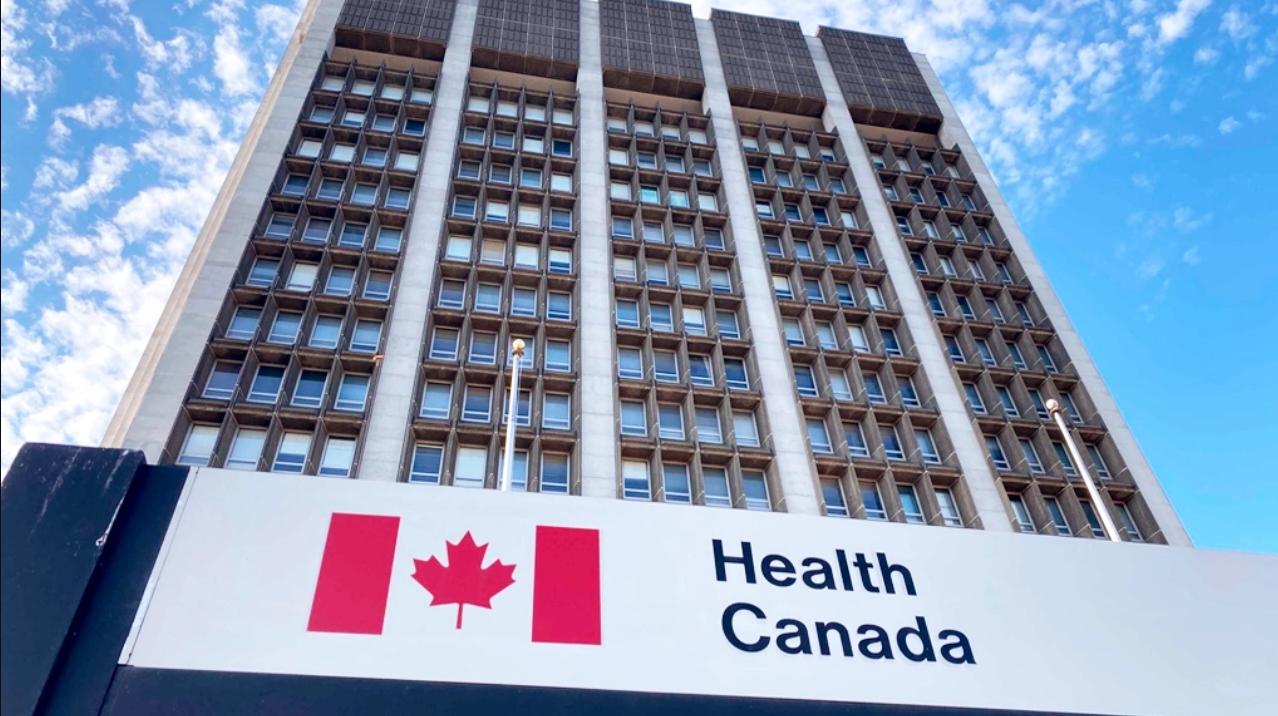
By Rob Salerno | OTTAWA, Canada – Health Canada issued new guidance this month that effectively ends the ban on sperm donations from men who have sex with men, ending more than three decades of legal discrimination.
Regulations barring tissue donations from men who have sex with men were put in place in Canada and many other countries during the early days of the AIDS crisis as a means of reducing the likelihood of spreading HIV through donations. In Canada, the regulations included a blanket ban on blood, semen, organs, and other tissues from any man who had ever had sex with another man, even once, since 1977.
As the testing process and treatment and prevention efforts for HIV improved, these bans proved to be scientifically unnecessary barriers to allowing gay and bisexual men to donate.
But as Health Canada began removing donor restrictions on blood from men who have sex with men, the restriction on sperm and other tissues persisted. That discrimination is finally over.
Going forward, would-be sperm donors in Canada will be screened on a behavior-based risk assessment, rather than on whether or not they have had a same-sex partner.
The move comes as the U.S. Food and Drug Administration has announced that it is also moving to end its ban on gay and bisexual sperm donors by the end of this year.
A gay man had also filed a suit against the Canadian government, alleging the sperm donation ban violated his right to equal treatment.
Because Canadian law bans paying donors for sperm samples, Canada sources most of its sperm samples from the United States.
Global LGBTQ+ news gathering & reporting by Rob Salerno
Canada
Canadian Pride events ban Conservative politicians
Pride festivals in Alberta and Saskatchewan Canada have banned lawmakers who have pushed anti-trans policies
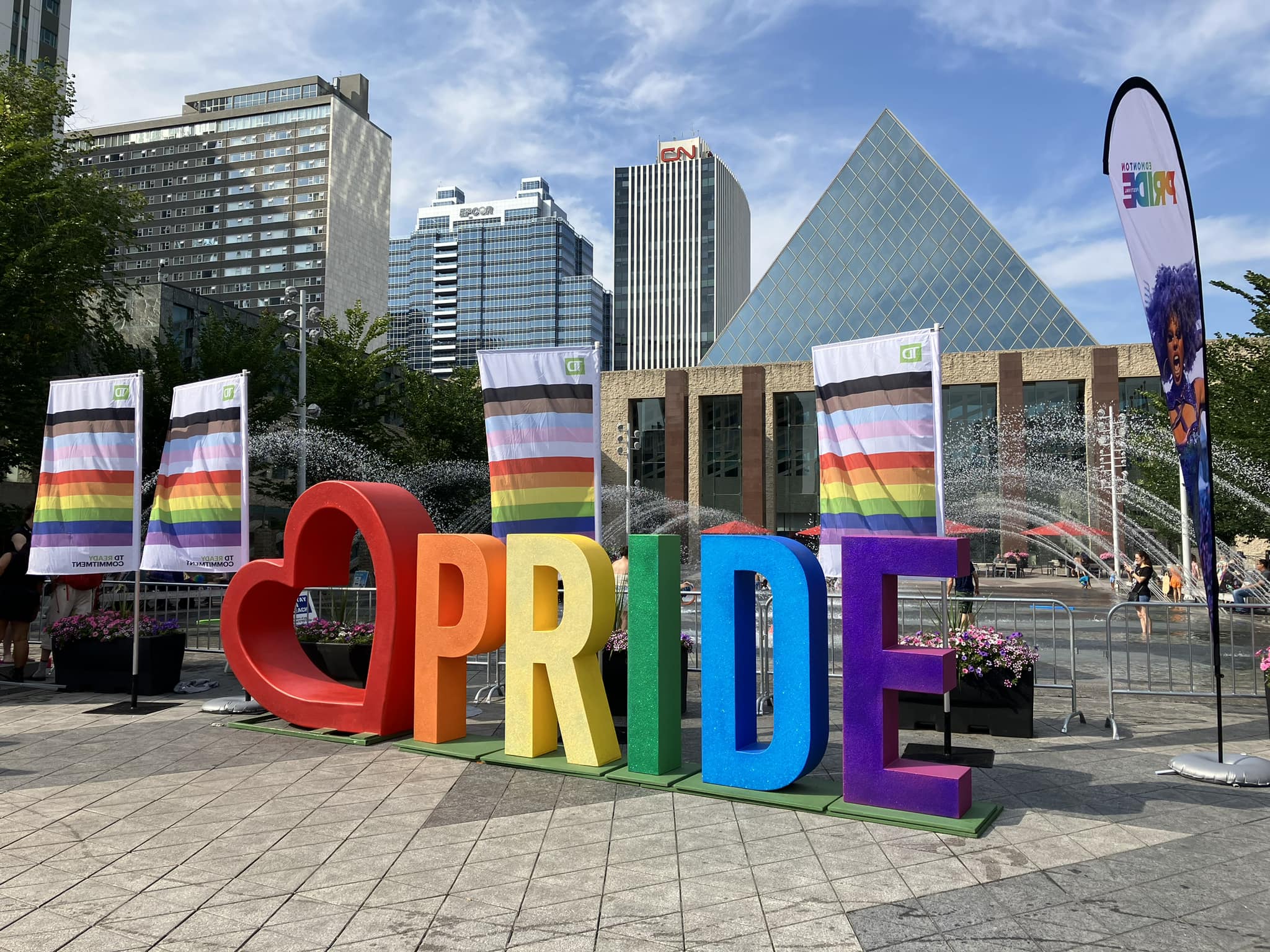
By Rob Salerno | EDMONTON, Canada – Pride festivals in two of Canada’s most politically conservative provinces are putting their feet down and barring lawmakers who are pushing anti-trans legislation from participating in Pride festivities this season.
This week, nine Pride festivals across Alberta – including those in the largest cities Calgary and Edmonton – put out a joint statement that they will “not allow the participation of the United Conservative Party (UCP) in our 2024 pride celebrations.” The move came days after several Pride festivals in neighboring Saskatchewan announced they had barred the conservative Saskatchewan Party from participating in their parades.
Both provinces have recently passed or announced policies that would harm trans youth.
Last year, Saskatchewan enacted a regulation that would require schools to out gender non-conforming children to their parents, and when the regulation was struck down by a court, the government enacted a law using the “notwithstanding” rule that allows governments to circumvent the federal Charter of Rights.
In January, Alberta’s conservative government announced it would bring forward legislation in the fall to ban gender confirming surgeries on minors, restrict hormone treatment for minors under 16, bar trans children from playing in gender-appropriate school sports, and require parental notification for students to use a preferred name or pronoun.
“This is a direct response to Premier Danielle Smith’s stated intention to infringe on the rights, freedoms, and healthcare of the transgender community in Alberta,” the statement put out by the Alberta Pride organizations reads. “You may not join our celebrations in June when you plan to attack us in September.”
“Queer rights should not be a political decision. Trans rights are human rights. We invite Premier Smith to re-consider her harmful and damaging policies and engage in meaningful discussions with the Two Spirit, Trans, Non-Binary, and Queer community.”
Other Pride festivals barring the UCP from participating include festivals in Red Deer, Lethbridge, Banff, Canmore, Lacombe, Jasper, Fort Saskatchewan, and Okotoks. The statement was also joined by three queer service organizations.
“When queer people are being attacked by our government, we come together and get things done,” says James Demers, a community organizer with Queer Citizens United, the umbrella organization of Alberta Pride societies that put together the statement.
Queen City Pride, which organizes the annual Pride festival in Saskatchewan’s capital Regina, was the first city to announce that it would not allow the Saskatchewan Party to participate in its events.
“We decided as a board that we might have to put some distance between us and the Saskatchewan Party. We were very hopeful that they would change course, but they’ve gone against our Charter of Rights. We’re not ok with this, and they’re not backing down,” says Queen City Pride co executive director Riviera Bonneau.
The Saskatchewan Party has participated in the Queen City Pride in the past, with Premier Scott Moe even marching in the parade in 2019. At the time, he told CTV News he believed it was the “right thing for a Premier to do.”
“The thing that triggered our announcement was that the Saskatchewan Party had put forward a registration to participate in our parade,” Bonneau says. “I don’t know why they’d want to participate, but they did try.”
Bonneau says she communicated with other Pride festivals in the province before announcing the decision publicly, as she didn’t want to pressure other festivals to make the same decision. In the event, Pride festivals in Prince Albert, Moose Jaw, Swift Current, and The Battlefords announced that they would not allow the Saskatchewan Party to participate, while a spokesperson for Saskatoon Pride told CBC that it would carefully vet any application to participate, and the Party would be unlikely to be accepted.
While the federal Conservative Party has offered support for the anti-trans policies announced by both provinces, Bonneau says her organization has not banned the federal party yet for a simple reason: it hasn’t applied to participate.
But Demers says his group’s stance is that the federal Conservatives are not welcome at the member festivals either.
“They’re not any nicer to us than the UCP are. I think the consequence extends to them as well,” he says.
Demers says that the federal Conservative Party often applies to participate in Alberta’s Pride festivals, but is typically rejected.
“We have an application process for all of our Prides, and they never pass the process. They’ll typically hold a barbeque somewhere and call it a Pride event, but they have not been invited,” Demers says. “We’ve now formally disinvited them. We would not like them to show up and pretend that they care about us as their constituents. It’s us making it clear that they are not welcome.”
Canada
Ugandan LGBTQ+ activist asks for asylum in Canada
Steven Kabuye stabbed outside his home on Jan. 3

TORONTO — A prominent Ugandan activist who was stabbed outside his home earlier this year has asked for asylum in Canada.
Two men on motorcycles attacked Steven Kabuye, co-executive director of Coloured Voice Truth to LGBTQ Uganda, on Jan. 3 while he was going to work.
Kabuye posted a video to his X account that showed him on the ground writhing in pain with a deep laceration on his right forearm and a knife embedded in his stomach.
He spoke with the Washington Blade from Kenya on Jan. 8 while he was receiving treatment. Kabuye arrived in Canada on March 6.
Kabuye during an April 27 telephone interview with the Blade from Canada said Rainbow Railroad, a group that works with LGBTQ+ and intersex refugees, helped him “get away from the dangers that were awaiting me in Kenya and Uganda.” Kabuye said he asked for asylum in Canada because he “cannot return to either Uganda or Kenya.”
“The Ugandan government fails to get the culprits who wanted to end my life,” he said.
Kabuye told the Blade that Ugandan police officials threaten his colleagues when he publicly speaks about his case.
“Every time I come up and demand for the police to act out, they end up calling the colleagues of mine that remain in Uganda and intimidate them so they can scare me off, so they can make me pack up and keep quiet,” he said.
Ugandan President Yoweri Museveni last May signed his country’s Anti-Homosexuality Act that, among other things, contains a death penalty provision for “aggravated homosexuality.”
Canadian Foreign Minister Mélanie Joly described the law as a “blatant violation of human rights and fundamental freedoms of LGBTQ+ Ugandans.”
The U.S. has sanctioned Ugandan officials and removed the country from a duty-free trade program. The World Bank Group also suspended new loans to Uganda in response to the Anti-Homosexuality Act.
The Ugandan Constitutional Court last month refused to “nullify the Anti-Homosexuality Act in its totality.” A group of Ugandan LGBTQ+ activists have appealed the ruling.
“The previously concluded ruling did not make a difference,” said Kabuye.
Kabuye told the Blade he has an interview with Canadian immigration officials on Friday. He said he will continue to advocate on LGBTQ+ Ugandans from Canada.
“I’m very grateful to Rainbow Railroad,” said Kabuye. “They’ve still given me a chance to continue my advocacy.”
Canada
Canadian parliament debates regulating online hate speech & porn
As opposition-backed “Protecting Young Persons from Exposure to Pornography Act” nears passage, government introduces “Online Harms Act”
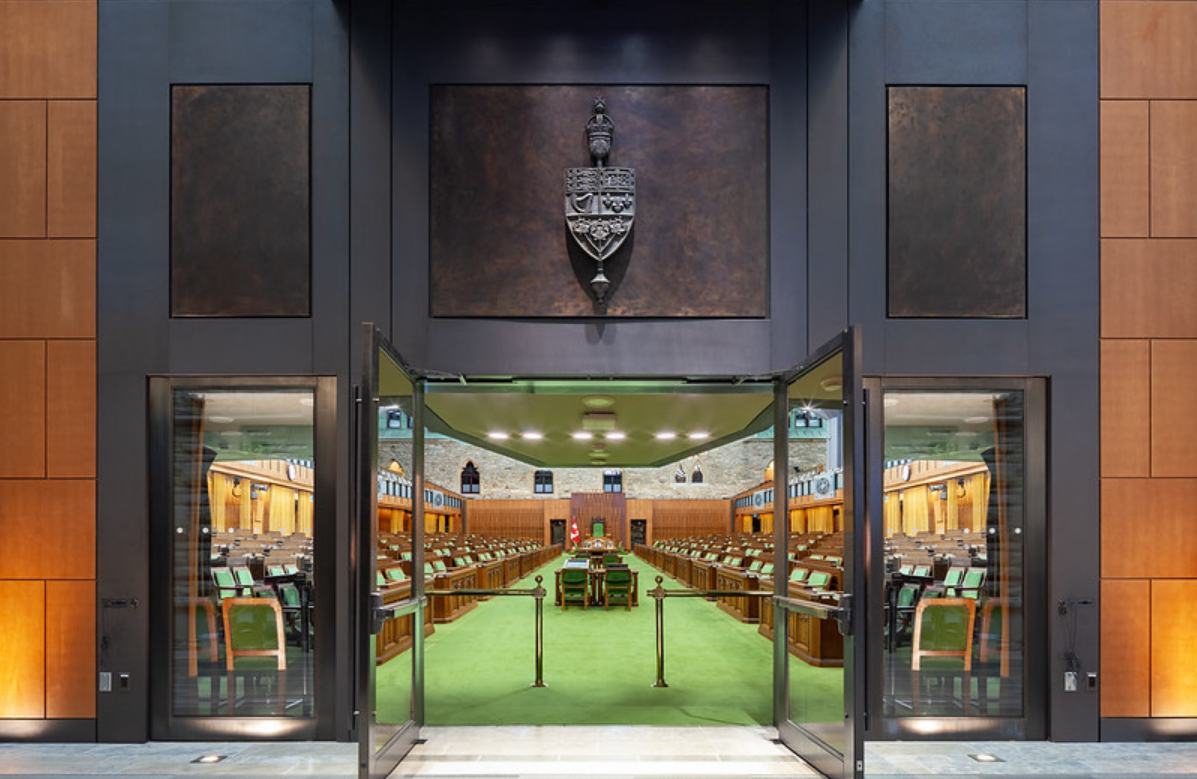
By Rob Salerno | OTTAWA, Canada – Canadian lawmakers are debating dueling bills meant to protect children from hate speech and pornography, and critics are saying both bills have serious civil liberties concerns and may restrict access to lawful LGBTQ+ content on the internet.
The Canadian government introduced it’s long-promised “Online Harms Act” (C-63) that aims to regulate and ban hate speech and revenge porn on the internet into Parliament on Monday. The government says the bill will hold online platforms accountable for the dissemination and amplification of harmful content.
The new bill would impose on social media companies an obligation to act responsibly for content on their services, including by protecting children and removing child porn and non-consensual porn. A new regulatory body would also handle complaints from Canadians about child and nonconsensual porn on the internet.
Additionally, the new bill would increase penalties for spreading hate propaganda online, with a maximum penalty set at life imprisonment.
Arif Virani, the minister of justice, says the government’s bill is necessary to protect children from exploitation and psychological harm online.
“Children are vulnerable online. They need to be protected from online sexual exploitation, hate and cyberbullying. Now more than ever, especially given the evolving capabilities of AI, online platforms must take responsibility for addressing harmful content and creating a digital world where everyone can participate safely and freely. This legislation does just that,” Virani says.
The bill comes as the largely opposition-backed “Protecting Young Persons from Exposure to Pornography Act” (S-210) nears passage. S-210 aims to prevent young people from accessing online pornography by requiring any site that habitually shows pornography to require age verification.
It’s not yet clear how the sites would be required to verify users’ ages – that’s meant to be developed in future regulations. But proposals have included facial scanning that uses AI to estimate users ages or requiring users to submit government ID to the site. Civil liberties critics have said both ideas intrude on civil liberties and put users’ personal information in jeopardy, and both are likely to be easily circumvented.
The bill also does not define what sites would be required to verify ages. Pure porn sites would be included, but it’s possible that search engines like Google or social media platforms like Twitter and Reddit would. Given the heavy penalties S-210 would impose for violations, platforms may respond by either overzealously blocking content or blocking access from Canada entirely
The government does not support S-210, but it has already passed through the Senate and passed second reading in the House of Commons with the support of all opposition parties and a handful of Liberal government MPs. It’s currently in the committee stage.
The government bill, C-63, does not address access to legal pornography. The opposition Conservative Party denounced C-63 before it was even introduced.
But the parties have spent the last few weeks sparring over S-210. Last week, Conservative party leader Pierre Poilievre said if he were Prime Minister he would require porn sites to verify ages, but Conservatives have consistently said they oppose every proposed measure to verify ages and not proposed any other mechanisms.
The bill’s sponsor, Conservative MP Karen Vecchio, told the House in November, “there should be no direct collection of identity documentation by the site publisher from the pornographic site, no age estimates based on the user’s web browser history and no processing of biometric data for the purpose of uniquely identifying or authenticating a natural person.”
And last week, one of the largest porn sites in the world, PornHub, which is owned by the Montreal-based porn conglomerate Aylo, which also owns SeanCody, Men.com, and WhyNotBi, waded into the debate. Solomon Friedman, a Vice-President of Aylo’s parent company Ethical Capital Partners, says that the company would never agree to collect users’ data and would simply block access to all of Canada. He’s calling instead for device manufacturers to build age restrictions into the phones and laptops that children use.
“We will never ever take the private identifying information of our users,” Friedman told the Canadian Press.
“(We) will always comply with the law,” he said. “That’s either by imposing the solution, not operating … or in addition to all those, challenging these in law, if we think that they violate some higher legal principle like the Constitution.”
Pornhub has already blocked access from several US states in response to similar ID-requirement laws. But some critics have questioned the effectiveness of the laws, pointing out that data shows usage of VPNs, which hide a user’s geographic location and would enable them to get around such blocks appeared to skyrocket in those states immediately after.
******************************************************************************************
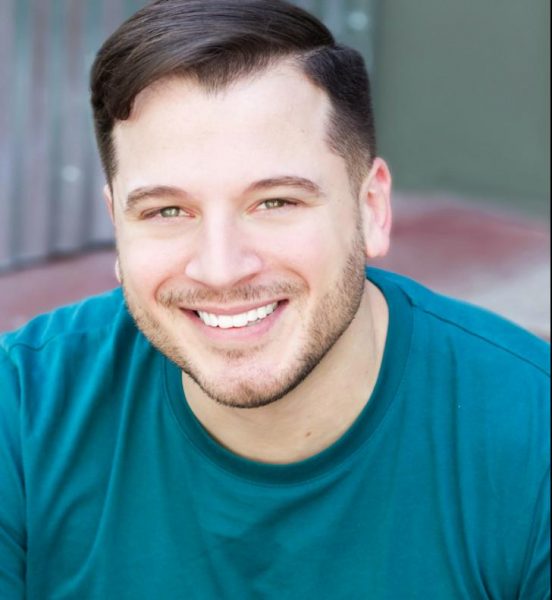
Rob Salerno is a writer and journalist based in Los Angeles, California, and Toronto, Canada.
Canada
Canadian town narrowly votes to ban Pride flags
Conservatives in Canada have increasingly taken to campaigning against LGBTQ rights, and particularly in Alberta

By Rob Salerno | WESTLOCK, Canada – The small town of Westlock, Alberta voted yesterday to ban the display of Pride flags, as well as any flag other than the Canadian flag or provincial and municipal flags, on public property, in a referendum that saw the ban win by a margin of just 24 votes.
Unofficial results posted Thursday night at 9:30 showed the flag ban received 663 votes in favor and 639 votes against.
The town of 5,000 people about 50 miles north of Edmonton was required to hold the citizen-initiated referendum over the objections of its council due to Alberta’s Municipal Government Act.
Anti-LGBTQ+ activists began organizing against Pride flags when the local high school’s gay-straight alliance asked the town council for permission to install a rainbow crosswalk near the town hall. The council voted unanimously to allow the students to paint the crosswalk and the RF Staples School Thunder Alliance installed it in June.
Anti-LGBTQ+ activists promptly set to work collecting signatures for their anti-Pride-flag initiative and got 700 signatures by September – more than enough to force the town to hold the referendum.
The referendum asked residents, “Do you agree that: Only Federal, Provincial and Municipal flags may be flown on flagpoles on Town of Westlock municipal property, all crosswalks in the Town of Westlock must be the standard white striped pattern between two parallel white lines, and the existing rainbow colored crosswalk in the Town of Westlock be removed?”
It’s not clear when the rainbow crosswalk will be removed.
In a press release issued after the results were made public, Westlock mayor Jon Kramer said the town council will continue to support the 2SLGBTQIA+ community, even as it is required to uphold the bylaw.
“Council did not support the proposed Crosswalk and Flagpole Bylaw, as we felt it went against our commitment to equity, diversity and inclusion. This plebiscite is binding, and as such, the bylaw does restrict how we are able to show this commitment. However, we will continue to find ways to embrace those in our community who need a helping hand, including marginalized groups,” he said.
“Equity is the reason we require wheelchair accessible parking; it is why we are developing an accessible playground; and yes, it is the reason we show support to marginalized groups like our local 2SLGBTQ+ community. That won’t stop, it will just take on a different form. We know the Town of Westlock is a welcoming community and that will not change.”
Petition organizer Stephanie Bakker has been at pains to stress that her activism has been about forcing the government to be “neutral,” rather than specifically anti-LGBTQ+, even though it was only the Pride crosswalk that motivated her to action.
In a post on her campaign web site, she thanks the town for voting in favor of the ban, and says that an official announcement will follow.
Activists in Alberta aren’t taking this defeat lying down.
“Smells like discrimination. Looks like discrimination. It is discrimination. I’d expect a court challenge on the way. You can’t single out the 2SLGBTQ+ community and call it neutrality. That’s a violation of human rights,” says Kristopher Wells, an activist and educator in Edmonton, in a post on X.
Under Alberta law, the municipal government may not repeal or amend the bylaw until three years have passed from the referendum date. Alternatively, another citizen-initiated referendum could be called to repeal, but only after a year has passed. However, the bylaw is not immune from a possible constitutional challenge.
Conservatives in Canada have increasingly taken to campaigning against LGBTQ rights, and particularly in Alberta, where the government recently announced new policies restricting teaching about LGBTQ+ people in schools, restricting access to gender care for trans youth, and requiring trans students to get parental permission to use a different name or pronoun in school.
Also on Thursday, Canadian Prime Minister Justin Trudeau was in Edmonton, where he met with LGBTQ+ community members. At a press conference, he delivered sharp criticism of the Alberta government’s proposed policies, calling them “some of the most difficult policies against vulnerable youth that the country has ever seen.”
“Why has the right suddenly decided to attack the LGBTQ community?” Trudeau said. “Shame on them. And of course, as a government we’re going to be there to protect our most vulnerable.”
******************************************************************************************

Rob Salerno is a writer and journalist based in Los Angeles, California, and Toronto, Canada.
Canada
Canadian intel agency: Anti-LGBTQ+ groups are ‘extreme threat’
CSIS warns Canadians & law enforcement that ‘anti-gender’ activists & organizations may strike LGBTQ+ organizations and events
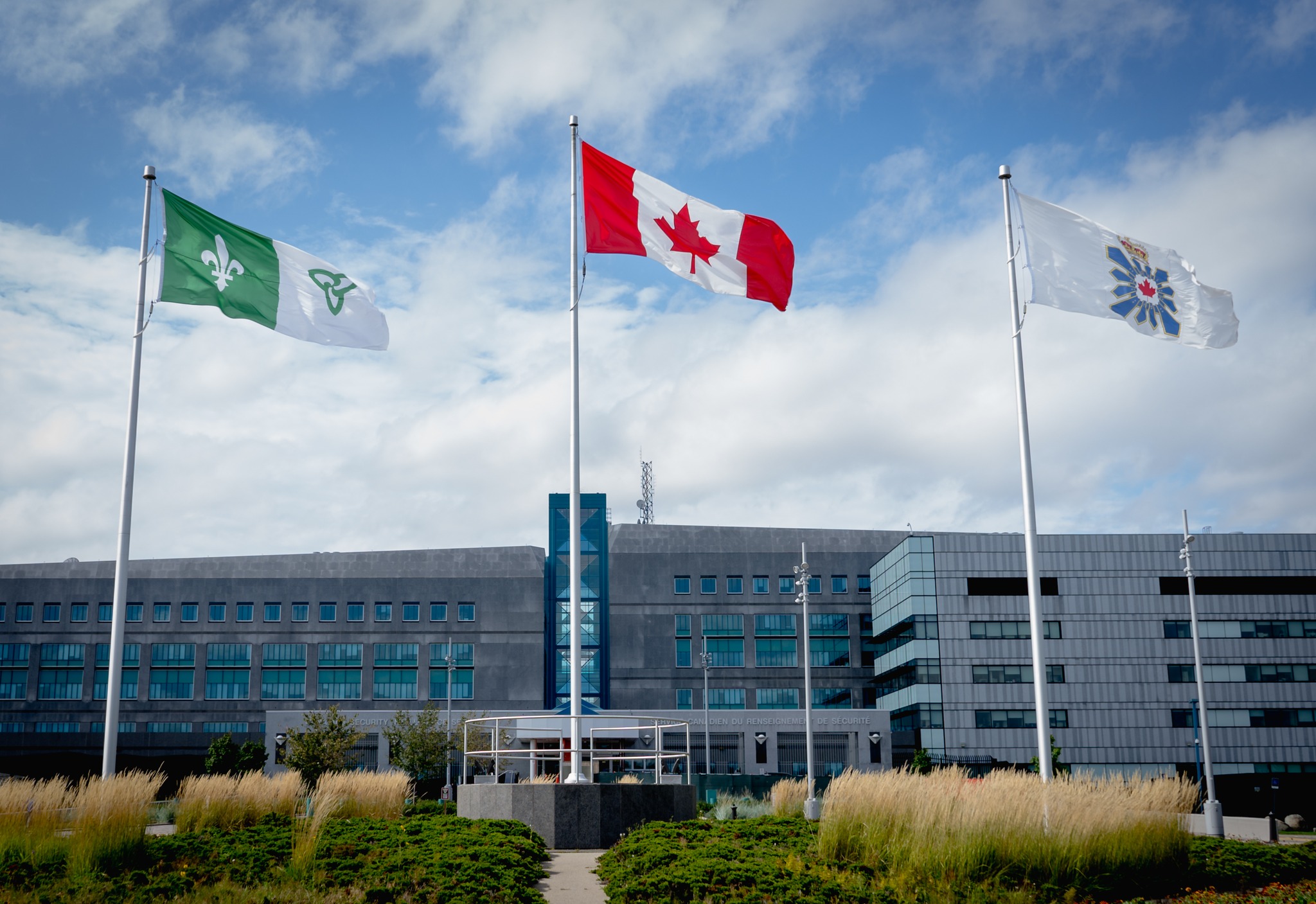
By Rob Salerno | OTTAWA, Canada – The Canadian Security and Intelligence Service (CSIS) is warning that anti-gender and anti-LGBTQ+ activists are posing a risk of “extreme violence” against the LGBTQ+ community in Canada, following a year of spreading organized anti-LGBTQ+ protests, anti-trans rhetoric coming from provincial governments, and an attack on a gender studies university class.
In a report obtained by the public broadcaster CBC, the CSIS Integrated Terrorism Assessment Centre (ITAC) says it is monitoring the potential for a violent attack on Pride festivals and nightclubs across the country. The ITAC is charged with forecasting the possibility of terrorism in Canada, based on analysis of actor intent, capability, and opportunity.
“Anti-LGBTQ+ narratives remain a common theme in violent rhetoric espoused by white nationalists, neo-Nazis, the Freedom Movement, and networks such as Diagolon and QAnon,” the report says, according to the CBC. “Trans and drag communities in Canada have been the target of several online threats and real-world intimidation tactics in recent months.”
The Blade has requested a copy of the report, but it has not been made public at this time.
Last June, a knife-wielding man attacked a class on the philosophy of gender at the University of Waterloo, approximately 70 miles west of Toronto, injuring the professor and two students before he was subdued. He now faces 11 terrorism-related charges.
“CSIS assesses that the violent threat posed by the anti-gender movement is almost certain to continue over the coming year and that violent actors may be inspired by the University of Waterloo attack to carry out their own extreme violence against the LGBTQ+ community or against other targets they view as representing the gender ideology ‘agenda,’” CSIS spokesperson Eric Balsam says in an email.
Balsam says that CSIS believes the network of anti-LGBTQ+ and far-right communities in Canada may be a breeding ground for violent activities.
“While violent rhetoric itself does not equate or often lead to violence, the ecosystem of violent rhetoric within the anti-gender movement, compounded with other extreme worldviews, can lead to serious violence. CSIS assesses that exposure to groups and individuals espousing anti-gender extremist rhetoric could inspire and encourage serious violence against the LGBTQ+ community, or against those who are viewed as supporters of pro-gender ideology policies and events,” he says.
Last year, Pride Toronto executive director Sherwin Modeste told XtraMagazine that the festival was boosting its security and increasing emergency drills to prepare for the festival in the wake of rising anti-LGBTQ+ rhetoric and hate crimes.
According to the latest figures from Statistics Canada, the number of police-reported hate crimes based on sexual orientation has increased in each of the last three years, from 265 incidents in 2019, to 491 in 2022, the most recent year for which statistics are available, a staggering 85% increase. The 2019 figure had been a record number when it was reported.
Far-right groups in Canada coalesced during the COVID-19 pandemic around protests against vaccine and mask mandates, culminating in a siege of downtown Ottawa and a blockade of border crossings that lasted for nearly a month in February 2022. It is believed that as COVID receded as an animating issue, many of the networks involved transitioned to protesting LGBTQ+ rights and transgender rights in particular.
A small but organized group of anti-LGBTQ+ activists have organized sustained campaigns targeting school boards, libraries, drag performances, pride festivals, and provincial legislatures to oppose LGBTQ+ rights and sex education in schools for the last two years. The protests are generally outnumbered by counter-protesters who support LGBTQ+ rights, but there have been sporadic reports of violence and arrests at the protests.
Last fall, the far-right X account Libs of TikTok, whose operator Chaya Raichik has boasted that her anti-LGBTQ+ “shitposts” frequently inspire violence and bomb threats, turned her attention to a school in suburban Vancouver because a teacher who is nonbinary works there.
While no violence emerged from the post, the parent who drew Raichik’s attention was given a warning by the Royal Canadian Mounted Police (RCMP) to stop harassing school officials, but she has continued to post racist, homophobic, and transphobic statements to her X account. While Canada has long enjoyed relative peace on LGBTQ+ issues, starting last year, several conservative-led provincial governments began introducing policies to restrict the names and pronouns students can use at school in the name of “parents’ rights.”
Recently, the Alberta government went further, announcing that it would restrict gender care for minors, bar trans girls from sports, and require schools to obtain written permission from parents before sexual orientation or gender can be discussed in classrooms.
******************************************************************************************

Rob Salerno is a writer and journalist based in Los Angeles, California, and Toronto, Canada.
-

 Breaking News2 days ago
Breaking News2 days agoMajor victory for LGBTQ funding in LA County
-

 Features2 days ago
Features2 days agoKoaty & Sumner: Finding love in the adult industry
-

 Books4 days ago
Books4 days agoTwo new books on dining out LGBTQ-style
-

 Miscellaneous2 days ago
Miscellaneous2 days agoCan you really find true love in LA? Insights from a queer matchmaker
-

 Commentary7 hours ago
Commentary7 hours agoBreaking the mental health mold with Ketamine: insights from creator of Better U
-

 El Salvador3 days ago
El Salvador3 days agoLa marcha LGBTQ+ desafía el silencio en El Salvador
-

 Arts & Entertainment2 days ago
Arts & Entertainment2 days agoIntuitive Shana gives us her hot take for July’s tarot reading
